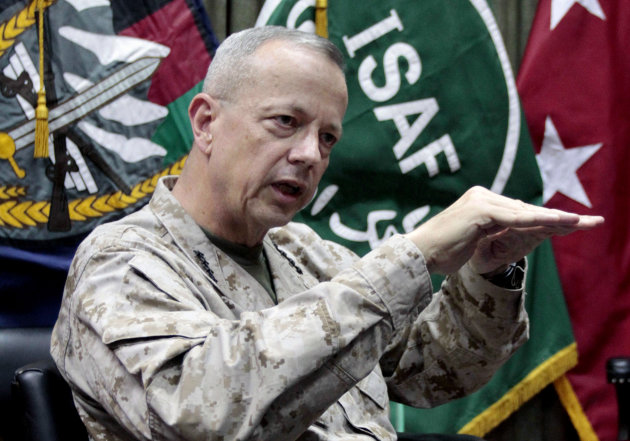
PERTH, Australia (AP) — In a new twist to the Gen. David Petraeus sex scandal, the Pentagon said Tuesday that the top American commander in Afghanistan, Gen. John Allen, is under investigation
for alleged "inappropriate communications" with a woman who is said to
have received threatening emails from Paula Broadwell, the woman with
whom Petraeus had an extramarital affair.
Defense Secretary Leon Panetta
said in a written statement issued to reporters aboard his aircraft, en
route from Honolulu to Perth, Australia, that the FBI referred the
matter to the Pentagon on Sunday.
Panetta said that he ordered a Pentagon investigation of Allen on Monday.
A
senior defense official traveling with Panetta said Allen's
communications were with Jill Kelley, who has been described as an
unpaid social liaison at MacDill Air Force Base, Fla., which is
headquarters to the U.S. Central Command. She is not a U.S. government
employee.
Kelley is said to
have received threatening emails from Broadwell, who is Petraeus'
biographer and who had an extramarital affair with Petraeus that
reportedly began after he became CIA director in September 2011.
Petraeus resigned as CIA director on Friday.
Allen, a four-star Marine general, succeeded Petraeus as the top American commander in Afghanistan in July 2011.
The
senior official, who discussed the matter only on condition of
anonymity because it is under investigation, said Panetta believed it
was prudent to launch a Pentagon investigation, although the official
would not explain the nature of Allen's problematic communications.
The
official said 20,000 to 30,000 pages of emails and other documents from
Allen's communications with Kelley between 2010 and 2012 are under
review. He would not say whether they involved sexual matters or whether
they are thought to include unauthorized disclosures of classified
information. He said he did not know whether Petraeus is mentioned in
the emails.
"Gen. Allen
disputes that he has engaged in any wrongdoing in this matter," the
official said. He said Allen currently is in Washington.
Panetta
said that while the matter is being investigated by the Defense
Department Inspector General, Allen will remain in his post as commander
of the International Security Assistance Force, based in Kabul. He
praised Allen as having been instrumental in making progress in the war.But the Allen investigation adds a new complication to an Afghan war effort that is at a particularly difficult juncture. Allen had just provided Panetta with options for how many U.S. troops to keep in Afghanistan after the U.S.-led coalition's combat mission ends in 2014. And he was due to give Panetta a recommendation soon on the pace of U.S. troop withdrawals in 2013.
The war has been largely stalemated, with little prospect of serious peace negotiations with the Taliban and questions about the Afghan government's ability to handle its own security after 2014.
The FBI's decision to refer the Allen matter to the Pentagon rather than keep it itself, combined with Panetta's decision to allow Allen to continue as Afghanistan commander without a suspension, suggested strongly that officials viewed whatever happened as a possible infraction of military rules rather than a violation of federal criminal law.
Allen was Deputy Commander of Central Command, based in Tampa, prior to taking over in Afghanistan. He also is a veteran of the Iraq war.
In the meantime, Panetta said, Allen's nomination to be the next commander of U.S. European Command and the commander of NATO forces in Europe has been put on hold "until the relevant facts are determined." He had been expected to take that new post in early 2013, if confirmed by the Senate, as had been widely expected.
Allen was to testify
at his confirmation hearing before the Senate Armed Services Committee
on Thursday. Panetta said he asked committee leaders to delay that
hearing.
The senior defense official said Panetta has not talked
to Allen about the investigation, nor has he discussed the matter with
President Barack Obama, although he consulted with unspecified White
House officials before making the decision to seek a postponement of
Allen's confirmation hearing.Panetta did talk about the Allen matter with Gen. Martin Dempsey, chairman of the Joint Chiefs of Staff, who happens to also be in Perth for a meeting of American and Australian diplomatic and defense officials. Those talks were starting Tuesday with an official dinner.
With a
cloud over Allen's head, it was unclear Tuesday whether he would return
to Kabul, even though Panetta said Allen would remain in command. The
second-ranking American general in Afghanistan is Army Lt. Gen. James
Terry.
NATO officials had no comment about the delay in Allen's appointment.
"We have seen Secretary Panetta's statement," NATO spokeswoman Carmen Romero said in Brussels. "It is a U.S. investigation."
Panetta
also said he wants the Senate Armed Services Committee to act promptly
on Obama's nomination of Gen. Joseph Dunford to succeed Allen as
commander in Afghanistan. That nomination was made several weeks ago.
Dunford's hearing is also scheduled for Thursday.








0 comments:
Post a Comment